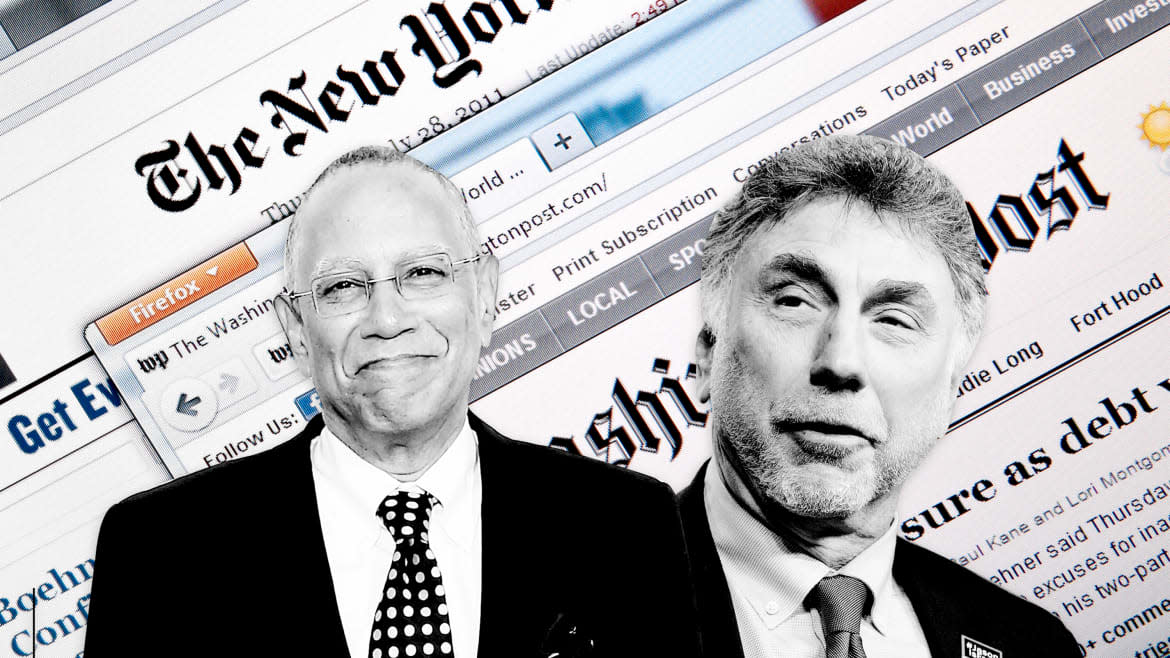America’s Top Newspaper Editors Alarmed by Assange Indictment

The editors of the nation’s most influential newspapers on Friday warned against President Donald Trump administration’s latest threat to the First Amendment, expressing distress over the Justice Department’s unprecedented use of the century-old Espionage Act to indict WikiLeaks founder Julian Assange for publishing classified material.
American media outlets regularly publish classified material, even on occasion over the objections of the White House, as a legitimate journalistic exercise in serving the public’s right to know. Previous administrations have conducted leak investigations, and sometimes have charged the alleged leakers, but they have uniformly opted not to prosecute the journalists.
In statements to The Daily Beast, New York Times Executive Editor Dean Baquet, Washington Post Executive Editor Marty Baron, Wall Street Journal Editor-in-Chief Matt Murray, and USA Today Editor in Chief Nicole Carroll all sounded the alarm over the Trump administration’s latest attack on the news media, which the president regularly calls “the enemy of the people.”
Baquet called the indictment “a deeply troubling step toward giving the government greater control over what Americans are allowed to know."
And Baron, noting that government officials regularly over classify documents that pose zero threat to national security, said the indictment “undermines the very purpose of the First Amendment.”
Meanwhile, Murray, of the Journal, said in statement to The Daily Beast: “Setting aside the specific facts of the Assange case, the indictment’s use of the Espionage Act raises deeply troubling implications for traditional journalism and freedom of the press in this country. The right to publish uncomfortable, important information that the government would prefer to be kept secret is central to a truly free press.”
Baquet’s statement in full: “A fundamental principle of the First Amendment is that journalists have the right to publish truthful information, even when a source may have broken the law to provide that information. In charging Julian Assange for receiving and disclosing classified information in violation of the Espionage Act, the government threatens to undermine that basic tenet of press freedom. Obtaining and publishing information that the government would prefer to keep secret is vital to journalism and democracy. The new indictment is a deeply troubling step toward giving the government greater control over what Americans are allowed to know."
Baron, meanwhile, declared: “Dating as far back as the Pentagon Papers case and beyond, journalists have been receiving and reporting on information that the government deemed classified. Wrongdoing and abuse of power were exposed. With the new indictment of Julian Assange, the government is advancing a legal argument that places such important work in jeopardy and undermines the very purpose of the First Amendment.”
He continued: “The administration has gone from denigrating journalists as ‘enemies of the people’ to now criminalizing common practices in journalism that have long served the public interest. Meantime, government officials continue to engage in a decades-long practice of overclassifying information, often for reasons that have nothing to do with national security and a lot to do with shielding themselves from the constitutionally protected scrutiny of the press.”
USA Today's Carroll told us, “Investigative journalists routinely obtain and publish information the government would like kept secret. This indictment threatens such reporting and is a chilling attack on press freedoms and the public’s right to know.”
The Daily Beast will update this story as further reactions arrive from top editors.
Got a tip? Send it to The Daily Beast here
Get our top stories in your inbox every day. Sign up now!
Daily Beast Membership: Beast Inside goes deeper on the stories that matter to you. Learn more.

